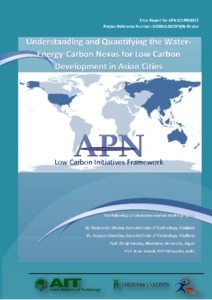Water and energy are, separately, key priority agendas; they are being planned and managed as separate entities. Yet, it is not common to look at their linkages and optimise them. As water and energy are becoming limited resources, water footprints in energy sectors and energy footprints in water sectors are increasing being a concern in development and planning processes. In the context of cities, energy is of primary importance to urban water system management. The water infrastructures rely on energy throughout each element of the system, source abstraction, conveyance, treatment, distribution, wastewater collection, treatment and recycle/disposal. Typically, fossil fuels are also the primary sources of energy which produce a considerable amount of carbon dioxide and other Green House Gases (GHGs) and release into the atmosphere. This gives rise to the concept of nexus where water, energy and carbon can be managed under the same domain. Cities are a significant place to study this nexus because of several reasons including, high population density, complex agglomeration of infrastructures, economy, industries, technologies and its overall dynamics. Cities are also a major emitter of GHGs with the share of 71% of global energy-related CO2 emissions. Urban water sector could utilise 1 to 18% of total energy use in the city. The Urban water sector is complex and diverse which involves processes of water services delivery to different economic sectors. The high energy demand for water utilities is one of the issues in the sustainable management of water and sanitation services in developing and developed countries. This research looks into case studies in four Asian cities: Bangkok, Tokyo, Delhi and Kathmandu.lustrate the potentials of the nexus to the low carbon development in cities, and (c) based on these, we will gauze the extent and relevancy of addressing the barrier and opportunities for optimising the water-energy-carbon nexus. We will cover four Asian cities in this research: Tokyo, Bangkok, Delhi and Kathmandu.
Project • LCI2013-02CMY(R)-Dhakal, LCI2012-02NMY(R)-Dhakal






